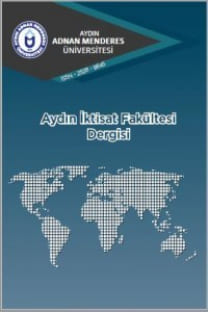Avrupa Birliği Ülkelerinde İhracat ve Doğrudan Yabancı Yatırımların Kadın İstihdamı Üzerindeki Etkisi: Panel Veri Analizi
Birçok ülkede kadın işsizlik oranlarını artıran temel nedenlerden biri kadınların işgücüne
katılımı açısından yaşanan cinsiyet ayrımcılığıdır. Bu sorun, uzun dönemde ülke ekonomileri
açısından ekonomik ve sosyal maliyetler ortaya çıkarır. Bu konuda ihracat ve doğrudan yabancı
yatırımlar (DYY) kadın istihdamının artırılmasında önemli bir çözüm aracı olabilir. Bu çalışma,
Avrupa Birliği ülkelerinde ihracat ve DYY’nin kadın istihdamı üzerindeki etkisini
araştırmaktadır. Bu doğrultuda AB üyesi on bir ülke için 1987-2014 dönemi verileri ile dinamik
panel veri analiz yöntemi kullanılarak analiz gerçekleştirilmiştir. Elde edilen tahmin
sonuçlarına göre, AB ülkelerinde ihracat ve DYY değişkenleri uzun dönemde kadın istihdamını
olumlu etkilemekte olup, bu ülkelerde ihracat düzeyindeki 1 birimlik artış kadın istihdamını
0,01 artırırken DYY’deki 1 birimlik artış ise kadın istihdamını 0,004 kadar artırmaktadır. Bu
sonuçlara göre kadınların işgücüne katılımı ya da kadın istihdamının artırılması açısından, AB
ülkelerinde DYY’lere göre, ihracatın daha etkin olduğu görülmektedir. Bu sebeple, AB
ülkelerinde kadın istihdamının artırılması için uluslararası piyasalarda ihracatçıların rekabet
gücünü arttıracak politikalar geliştirilerek ihracat teşvik edilmelidir.
Anahtar Kelimeler:
Kadın istihdamı, ihracat, Doğrudan yabancı yatırımlar, panel eşbütünleşme
The Impact of Export and Foreign Direct Investment on Employment of Women in Europan Union Countries: Panel Data Analysis
In many countries, one of the basic reasons increasing women unemployment rate is gender
discrimination occuring in terms of participation of women in the workforce. This problem
reveals the economic and social costs in terms of the countries’ economies in the long term. In
this regard, export and foreign direct investment (FDI) can be an important solution tool in
increasing women employment. This study investigates the export in the EU countries and the
effect of FDI on women employment. Accordingly, the analysis has been carried out by being
used of the data of the 1987-2014 period and the techiniques of dynamic panel data analysis for
11 countries which are the members of the EU. According to the results obtained, the variables
of export and FDI have positively affected women employment in the long term in the EU
countries. Furthermore, a unit increase in the export level increases women employment 0,01
while a unit increase in FDI increases women employment 0,004 in these countries. According
to these results, it can be seen that export is more effective than FDI in the EU countries in
terms of the participation of women in the workforce or of increasing women employment.
Therefore, export should be encouraged by developing policies that improve the
competitiveness of exporters in international markets in order to increase the employment of
women in the EU countries.
Keywords:
Women employment, Export, Foreign direct investment, Panel cointegration,
- ISSN: 2528-9845
- Yayın Aralığı: Yılda 2 Sayı
- Başlangıç: 2016
- Yayıncı: Adnan Menderes Üniversitesi
Sayıdaki Diğer Makaleler
TR32 Bölgesinin Lojistik Açıdan Analizi
Zekiye ÇAMLICA, Gülşah Sezen AKAR, Hüseyin ŞENKAYAS
Eğitim Kalitesinin Genç İşsizliği ile İlişkisi: PISA Test Sonuçları Üzerinden Bir Değerlendirme
Pelin MASTAR ÖZCAN, Umut TEPEKULE, Gül KAYALIDERE
Barış TUNÇAY, Hamza KAHRİMAN, Ramazan GÖKBUNAR
İşsizlikte Histeri Etkisinin Kalman Filtresi Yaklaşımıyla İncelenmesi: Türkiye Örneği
Kadir KARAGÖZ, Taha Bahadır SARAÇ
Avrupa Birliği Ülkeleri’nde İşsizlik Tuzağının Dinamik Panel Veri İle Analizi
